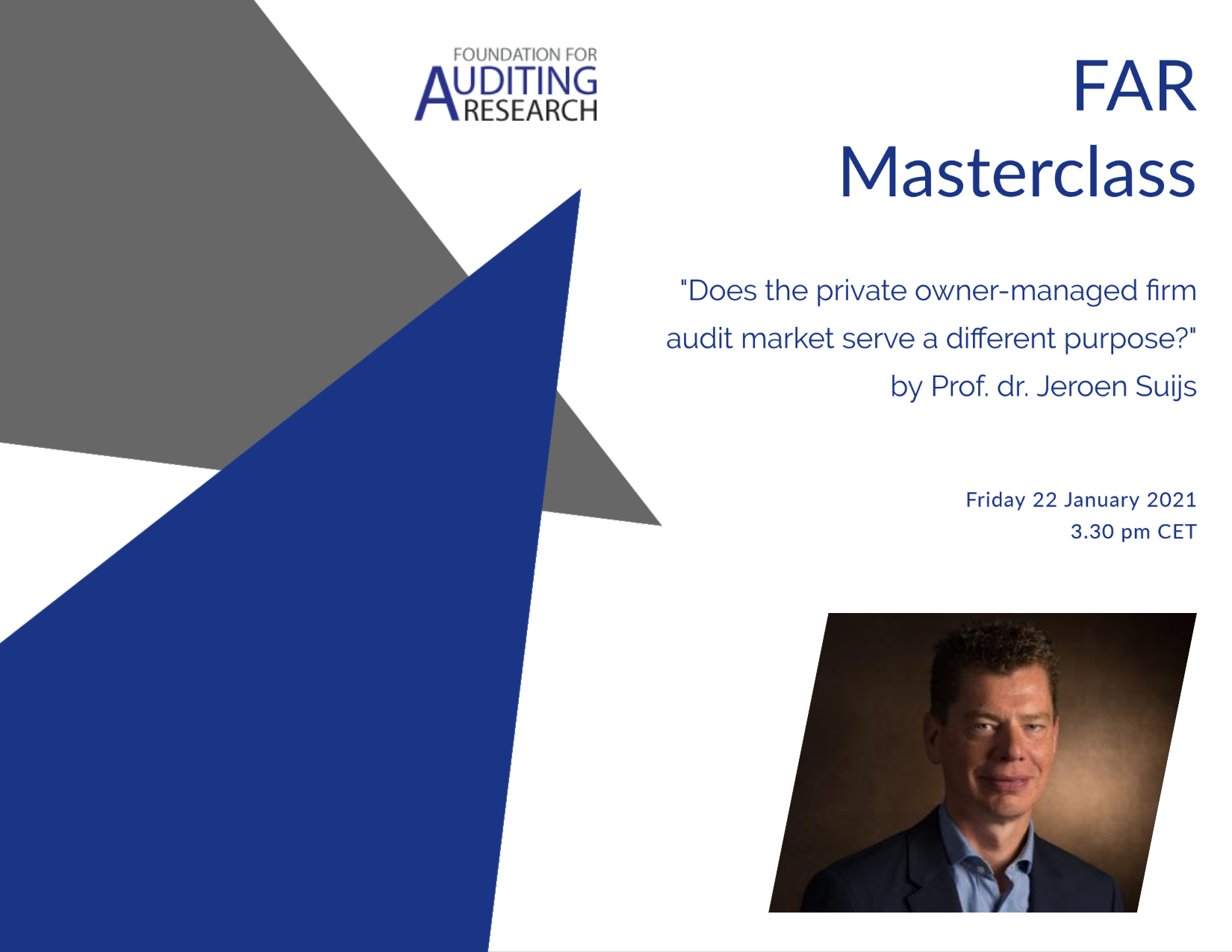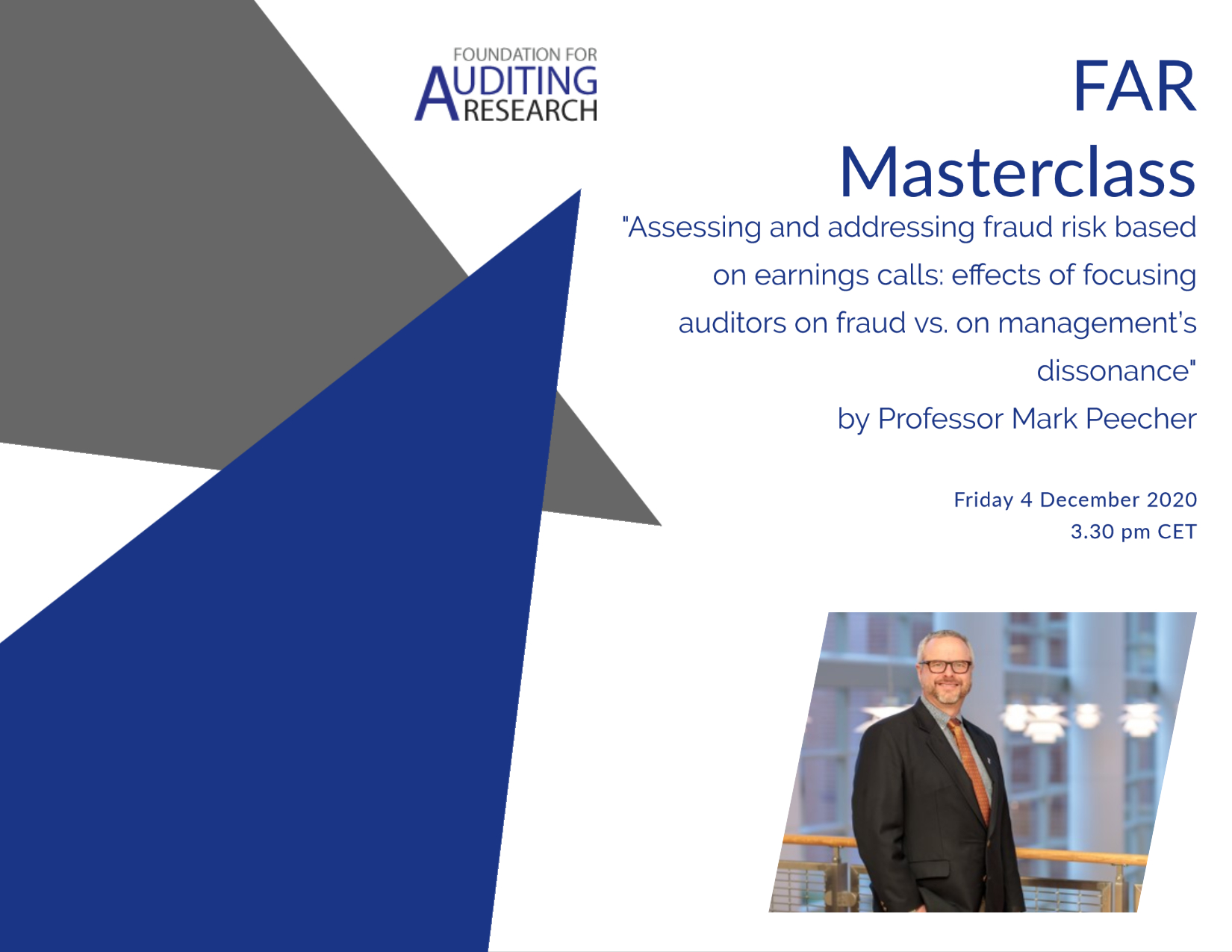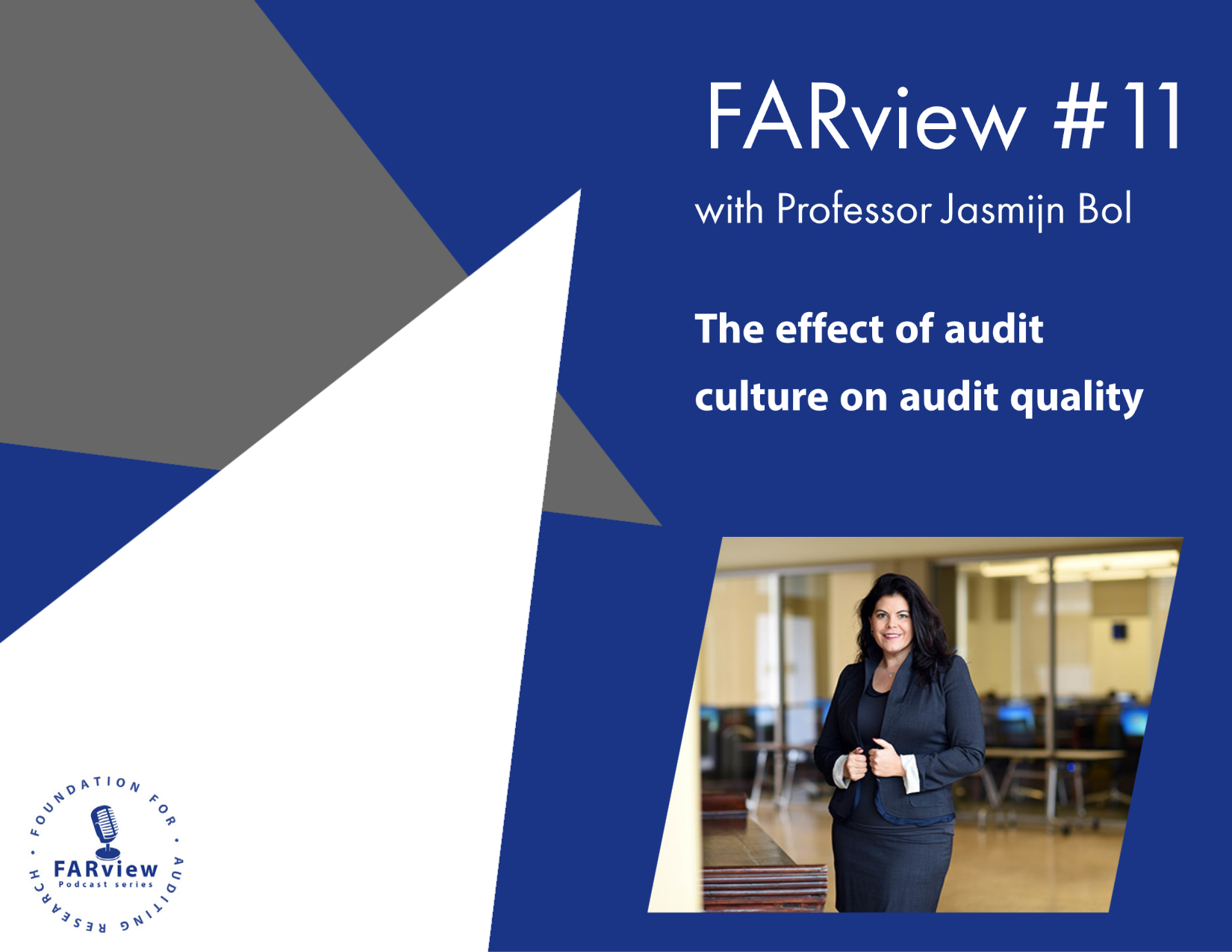Newsletter December 2020
18 December 2020

Want to be the first to know? Then don't forget to follow our LinkedIn page. Did you know that FAR also has a YouTube channel? Here you can find all of the FARview Podcasts.
Latest publications:
- Working Paper research project 2016B05 - 'Professional Skepticism Traits and Fraud Brainstorming Quality'
- Working Paper research project 2016B05 - 'Auditors' Professional Skepticism: Traits, Behavioral Intentions, and Actions'
Also in this newsletter
- Online FAR Masterclass by Prof. dr. Jeroen Suijs on “Does the private owner-managed firm audit market serve a different purpose?" on 22 January 2021
- Key take-aways online FAR Masterclass on 4 December 2020 by Professor Mark Peecher on "Assessing and addressing fraud risk based on earnings calls: effects of focusing auditors on fraud vs. management's dissonance"
- Recording of the online Masterclass by Professor Jasmijn Bol available
- FARview podcast #11 with Professor Jasmijn Bol (Dutch)
- Key take-aways online FAR Masterclass and podcast Professor Jasmijn Bol on "The effect of audit culture on audit quality"
- Round Table discussion on Audit Quality Indicators
- Upcoming events – save the dates!
- Other
Latest publications: 2 FAR Working Papers by Kris Hardies, Ann Vanstraelen, Sanne Janssen and Karla Zehms on professional skepticism
We have two new FAR Working Papers available on our website on professional skepticism.
The first working paper is entitled 'Professional Skepticism Traits and Fraud Brainstorming Quality' and can be read here: https://foundationforauditingresearch.org/files/sanne-janssen-2016b05-1-final.pdf
Auditing standards emphasize that fraud detection is an important objective of an audit and require the exercise of professional skepticism (PS) and a discussion among the engagement team to prevent and detect fraud. The purpose of this study is to examinewhether professional skepticismis a driver of fraud brainstorming quality.
The second working paper is entitled 'Auditors’ Professional Skepticism: Traits, Behavioral Intentions, and Actions' and can be found here: https://foundationforauditingresearch.org/files/sanne-janssen-2016b05-2-final.pdf
Auditors’ professional skepticism is critical to applying auditing standards and achieving audit quality. Prior research provides measures of skepticism in general, and auditor-specific trait skepticism. Other research develops and tests a theoretical modelof auditor professional skepticism, positingfactors that contribute to skeptical intentions and skeptical actions. In this paper, the research team provides an empirical test of these measures and theories, examining individual differences and personality traits that affect trait-based professional skepticism, testing the associations between factors related to behavioral intentions toward skepticism, and revealing their collective association with skeptical actions.
Online FAR Masterclass by Prof. dr. Jeroen Suijs on "Does the private owner-managed firm audit market serve a different purpose?" on 22 January 2021

On Friday, 22 January 2021, from 3.30 – 5.00 pm CET, FAR will organize an online Masterclass on “Does the private owner-managed firm audit market serve a different purpose?” by Jeroen Suijs, who is a Professor at Erasmus University Rotterdam.
Registration is now open via Eventbrite via this link and closes on 21 January 2021, 11:00 pm CET.
What is this Masterclass about?
Does the OMB environment call for different audits and auditing standards? What institutional factors (e.g., complexity, size, capital market structure, legal environment, audit risks, etc.) in the OMB environment may call for a specific audit approach and auditing standards for OMB audits?
This study is designed to examine whether economic forces and regulations (institutions) affect audits differently depending on whether these audits are executed for Public interest entities, privately owned businesses or owner-managed businesses. The researchers want to start to ask the question whether regulations should be the same for the different types of firms.
You can find links to the practice note and a literature review on this project on our website: https://foundationforauditingresearch.org/en/research-publications/projects/2017b01-does-the-private-owner-managed-firm-audit-market-serve-a-different-purpose-prof-dr-suijs/
Registration is open until Thursday 21 January 11.00 pm CET via this link
Please note that this Masterclass will be in English.
Key take-aways online FAR Masterclass on 4 December 2020 by Professor Mark Peecher on “Assessing and addressing fraud risk based on earnings calls”
On Friday 4 December 2020, Mark Peecher (Professor of Accountancy at Illinois, Gies College of Business) presented an online Masterclass on assessing and addressing fraud risk based on earnings calls.

The Masterclass was based on the preliminary findings of Mark’s FAR-study with Jessen Hobson, Sebastian Stirnkorb and Devin Williams. Mark started off with a historical sketch of developments in the auditor’s fraud responsibility in both the US and international auditing standards. He also discussed the pervasiveness of fraud. Fraud has increased quite dramatically from assessments a decade ago (some audit textbooks estimated that the rate of fraudulent financial reporting likely was 0.5% to 1.0%) to an estimate in a 2020 study of more than 22 percent of large US public corporations engaging in SEC actionable financial misrepresentation in an average year.
Bottom line: fraud is a very important topic for auditors to consider!
In their FAR study, Peecher et al. conducted a field experiment in which 184 auditors listen to their own clients’ earnings calls in the midst of audit engagements. They examine how auditors alter their assessment of the risk of material misstatement, including fraud risk, their plans for addressing these assessed misstatement risks, and the correlation between these two. Preliminary results indicate that prompting auditors to focus on fraud actually reduces auditor concern about fraud risk! Prompting a focus on management dissonance, by contrast, results in an increase in auditors’ assessed risk of material misstatement and strengthens the correlation among assessing and addressing risk (cognitive dissonance is the negative, uncomfortable emotion a person feels when they are saying something that they know is not true). The video of the Masterclass will be published online in January.
Recording of the online FAR Masterclass by Professor Jasmijn Bol available
On 16 October 2020 FAR organized an online Masterclass on 'The effect of audit culture on audit quality' by Professor Jasmijn Bol. It was an interesting and interactive session, which we recorded.
The edited version of the Masterclass is now available; you can watch it here.
You can read more about her project 2018B02 'Culture controls in audit firms' here.
FARview podcast #11 with Professor Jasmijn Bol (Dutch)

The 11th episode of our FARview series is now online. You can listen to the podcast (in Dutch) with Jasmijn Bol on our YouTube channel or via Soundcloud.
In this podcast we follow up on her Masterclass on ‘audit culture and the effect on audit quality’ with a more in-depth discussion.
Key take-aways online FAR Masterclass and podcast Professor Jasmijn Bol on "The effect of audit culture on audit quality"
Bols', still ongoing, research investigates the relationship between the culture within audit firms and audit quality.
The good news is that the people who (among other things) better understood the core values of their audit firm also had a greater willingness to push for audit quality.
But there is also less good news, for example, data clearly shows that accountants still experience a lot of budget pressure.
Incidentally, the study also shows that the willingness to push for quality depends on the personality of the accountant.
You can read the full report with the key take-aways here.
Round Table discussion on Audit Quality Indicators
In 2020, the Minister of Finance determined that there is a need for AQI’s that indicate the quality of the audit of financial statements. He has instructed the “Quarter Masters” to investigate the formal introduction of such AQIs, and the “Working group” of the Quarter Masters is at work.
In March of 2021, the “Maandblad voor Accountancy & Bedrijfseconomie” will dedicate a special edition to the AQI’s. How do we measure audit quality and who uses such measures? While the articles in the MAB will touch on these questions from various angles, the MAB would also like to know what the meaning of AQIs is for the various stakeholders around the audited organization.
To this end, the Foundation for Auditing Research and MAB are organizing a roundtable meeting.
The stakeholders are:
| Sector | Name |
| Analysts/Internal Auditing | John Bendermacher |
| CFO/Governance | Petri Hofsté |
| Regulator | Ruud de Hollander |
| Investors/working group AQI | Martijn Bos |
| Academics/researchers | Ann Vanstraelen |
| Auditors | Michael de Ridder |
| Law | Steven Hijink |
The report of this meeting will also appear in the March issue of the MAB (Dutch). The debate will take place on 25 January 2021.
Upcoming events – save the dates!

Online FAR Masterclass – Professor Jeroen Suijs
On Friday 22 January 2021 FAR will host an online Masterclass by Jeroen Suijs on “Does the private owner-managed firm audit market serve a different purpose?”.
Registration is now open. You can read more in the first item of this newsletter.
Online FAR Masterclass – Prof. dr. Ann Vanstraelen
On Friday 5 March 2021 FAR will host an online Masterclass by Ann Vanstraelen on “The drivers and impact of audit committee involvement on audit quality”
Online FAR Masterclass – Prof. Dr. Christian Hofmann
On Friday 28 May 2021, more info to follow.
FAR International Conference 2021
We hope to see you all live next year at the FAR Conference on 21 and 22 June 2021 in Breukelen, the Netherlands. Please save the date in your calendar!”¯
Other

Call for Research Assistants
Next to private data which is mainly collected by the liaised audit firms of FAR, most research projects ask for public data from Annual reports, registers and databases. To assist the firms in this operation, FAR works with a team of research assistants. For them, this is an excellent opportunity to gain experience in interpreting public sources, translating them to project-specific datasets and restructuring vast amounts of data. We try to produce high-quality, rich and consistent data, in which we succeed by thorough standardization of variable definitions, descriptions and examples.
FAR is always open to enthusiastic students who want to contribute to broad academic research in auditing. Are you interested, or do you know someone who is suitable for this flexible and relevant position? Then please respond to our vacancy at Randstad (Dutch) or feel free to contact Merel van der Kuip at FAR (merel.vanderkuip@foundationforauditingresearch.org).

Do you have suggestions on how to improve our newsletter or news you would like to share with us? Please let us know by sending an email to info@foundationforauditingresearch.org
Back to overview
